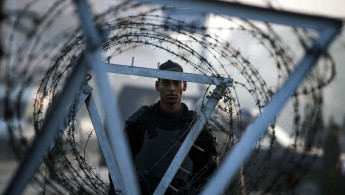Egypt summons Western envoys after criticism of lawyer's disappearance
Ibrahim Metwally was detained at Cairo International airport in September as he was due to board a flight for Geneva.
The lawyer, who has founded the Association for the Families of the Disappeared, provided legal assistance to the family of Italian student Giulio Regeni, whose tortured body was discovered in Cairo with suspicion that Egyptian authorities could be behind the murder.
At the time of Metwally's arrest, prosecution officials had said he was detained on suspicion of "dealing with foreign parties" and "spreading false news".
He was also accused of having set up an "illegal" group.
On Friday the embassies of Germany, Italy, The Netherlands, the United Kingdom and Italy issued a joint statement saying they were "deeply concerned" over Metwally's "ongoing detention".
"We are concerned at the detention conditions that Ibrahim Metwally... is reportedly enduring, and continue to call for transparency on prison conditions in Egypt," said the statement.
"We call on the Egyptian authorities to ensure the freedom of civil society and the protection from torture that are enshrined in the Egyptian Constitution," it added.
Egypt's foreign ministry said the summons was aimed at expressing "Egypt's strong dissatisfaction with the statement's blatant and unacceptable interference in its internal affairs".
The foreign ministry also denied that "torture" was underway in Egyptian prisons.
Regeni, a PhD student, went missing in Cairo on 25 January 2015 and his body was found days later bearing torture marks.
Egypt has faced accusations that one of its security services murdered the student who was researching trade unions but Cairo denied any such involvement.
Egypt has detained more than 60,000 people in the two years after Morsi was overthrown while hundreds have been forcibly disappeared and hundreds more have received death sentences as part of mass trials.
Rights groups say Egyptian President Abdel Fattah al-Sisi has given a "green light" to use systematic torture against detainees, allowing total impunity for actions which may amount to crimes against humanity.





 Follow the Middle East's top stories in English at The New Arab on Google News
Follow the Middle East's top stories in English at The New Arab on Google News
![The UAE is widely suspected of arming the RSF militia [Getty]](/sites/default/files/styles/image_330x185/public/2024-11/GettyImages-472529908.jpg?h=69f2b9d0&itok=Yauw3YTG)
![Netanyahu furiously denounced the ICC [Getty]](/sites/default/files/styles/image_330x185/public/2024-11/GettyImages-2169352575.jpg?h=199d8c1f&itok=-vRiruf5)
![Both Hamas and the Palestinian Authority welcomed the ICC arrest warrants [Getty]](/sites/default/files/styles/image_330x185/public/2024-11/GettyImages-2178351173.jpg?h=199d8c1f&itok=TV858iVg)